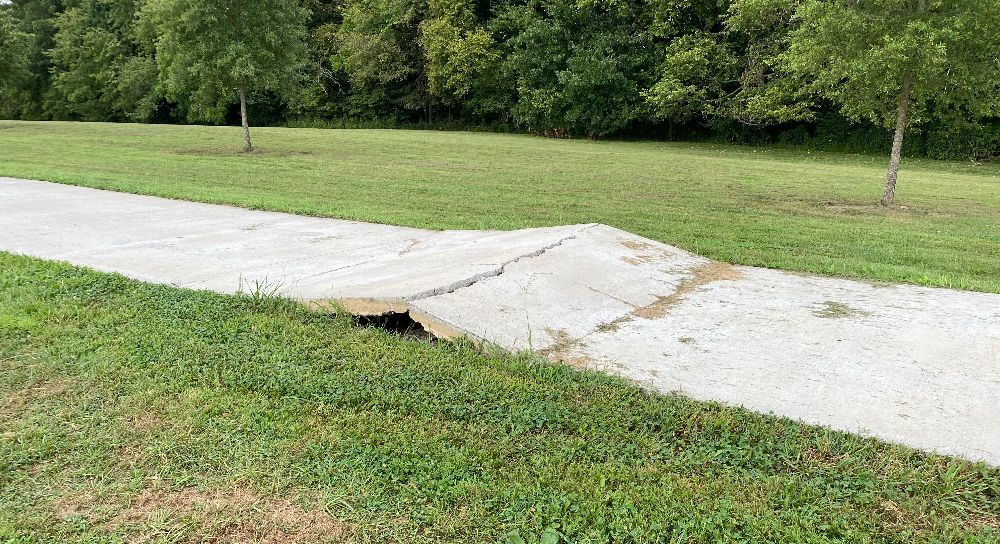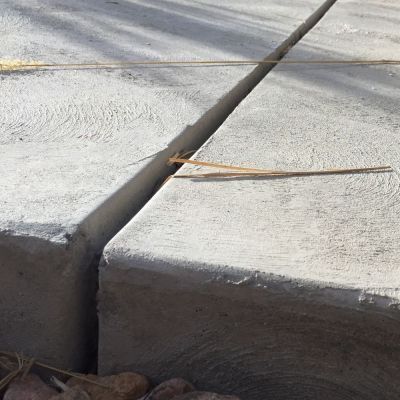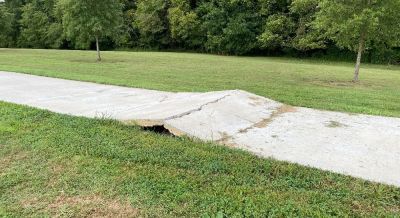
Learn about what expansion joints are, why they’re important, their common problems, and how you can keep up with their maintenance.
With so many terms and concepts about concrete out there, it’s hard to keep them all straight! Here at A-1 Concrete Leveling, we know concrete, and we want to pass that knowledge onto you.
This guide will walk you through what expansion joints are, their importance in keeping your concrete functioning how it should, some of their common problems, and how you can maintain them so your concrete can stay in great condition.
What is a concrete expansion joint?
An expansion joint is a purpose-made break in two concrete panels that allows the touching concrete slabs to expand and contract as the weather fluctuates. This joint allows for freer movement of the concrete and soil underneath with less stress on the slab itself, which can lead to unwanted cracks or breaks.

Expansion joints are created when the concrete itself is poured, and there are different materials commonly placed to separate the slabs. Some of these materials include rubber, felt, fiber, asphalt, flexible foam, and sometimes wood.
Why are expansion joints important?
Without an expansion joint in the concrete, the expansion and contraction of the concrete as temperatures dip and rise could cause unwanted cracking.
As these weather fluctuations occur, both the concrete and soil underneath expand and contract, causing the slabs to move and heave. Having an intentional joint where this can take place without unnecessary stress on the concrete slabs reduces the likelihood of cracking.

The Biggest Problem With Expansion Joints
Water is the primary cause of problems we see with expansion joints.
Water Erosion
Because, by design, expansion joints are gaps between concrete slabs, they can easily allow water to pass through them and run under the concrete slab. This becomes a problem when, over time, water flows through the joint and washes away the soil supporting the slab.
When expansion joints are left exposed to water, the continuous erosion of the soil and other sub-materials can cause the concrete slabs to become unlevel and in need of professional leveling services.
Read about concrete caulking to prevent water erosion.
How can you maintain your expansion joints?
Concrete maintenance is often an overlooked part of taking care of a home, but it is essential for ensuring that your concrete will last as long as possible.
Concrete Caulking
Caulking intentional expansion joints and unwanted cracks is a great way to prevent damage to your concrete. By keeping up with this maintenance practice, you will help prevent water from entering the slab and causing freeze-thaw damage, as well as eroding the sub-material and causing your slab to settle.
Removing Weeds
In addition to concrete caulking, making sure your expansion joints are clean and free of weeds is another important maintenance practice. The roots of weeds can grow into the pores of the concrete, causing it to deteriorate.
Replace Wooden Expansion Joints
Wooden expansion joints were, at one time, a common yet bad fad in concrete. These joints are very hard to upkeep and maintain, so we recommend having them removed and replaced with newer, modern alternatives.
What’s next?
Now that you know what expansion joints are and why they’re important, you’re ready to keep up with their maintenance to help avoid common expansion joint problems.
Concrete caulking is the best thing you can do for your expansion joints, and A-1 Concrete Leveling has you covered. Click the link below to request a free consultation and estimate for any concrete caulking, leveling, or cleaning and sealing needs.
Want to know more? Click the links below for more topics from our Learning Center:
Sarah Etler joined A-1 Concrete Leveling after receiving her Bachelor of Arts degree in English from Northern Kentucky University. As A-1's Content Marketing Manager, she works closely with industry experts to produce content that will best answer questions related to concrete repair and maintenance practices. Sarah loves living a life full of discovery and is excited every day to see what new things she can learn and share with those around her.
Topics: